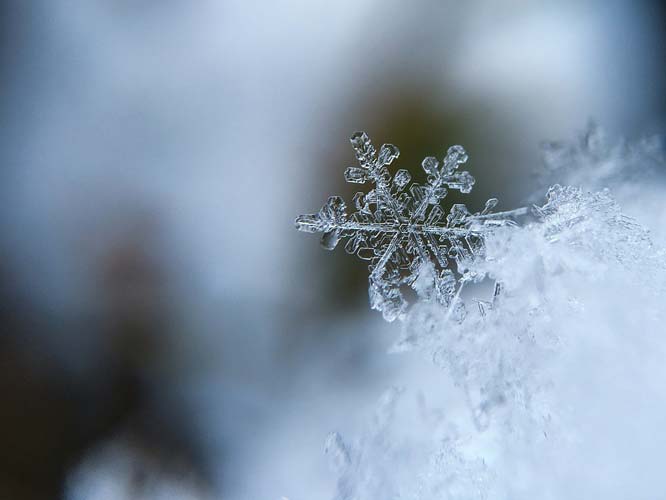
After all, the story from the Arizona Capitol Times details a proposed bill that would expand racketeering laws in the state to make it easier to prosecute people involved in protests that turn violent, a policy change that could have significant First Amendment ramifications.
But then, in the middle of the story, we meet Sen. Sylvia Allen.
" 'R-Snowflake' just made my week," MSNBC's Chris Hayes tweeted.
"Snowflake," for those blessedly unaware, is a term that gained traction after Election Day as a way of describing frustrated supporters of Hillary Clinton. A snowflake is fragile and melts under a slight bit of heat, allowing it to serve as a metaphor for those who are perceived to be overly sensitive on political issues.
For example, here is Mike Cernovich - one of the better-known members of the alt-right, a small, far-right movement that seeks a whites-only state - using the term in December 2015.
"People are kicked out merely because a snowflake does not 'feel comfortable.' That's the world feminists made."
On Reddit, the sort of place where such dismissive political jargon is embraced, use of the term shot up after Nov. 8.
Why can't these delicate snowflakes accept that Donald Trump won, etc. etc. There were some attempts to reclaim it, but it's generally a pejorative.
Which is why MSNBC's Hayes found Allen's description amusing. This was a Republican being described as a snowflake - thanks to her role representing Snowflake, Ariz. -- and who ironically was demonstrating the sort of behavior that would earn a liberal "snowflake" status. "I have been heartsick with what's been going on in our country, what young people are being encouraged to do," she said, displaying the sort of emotional sensitivity that might melt a snowbank.
But there's another level of irony at play here. There are three places in the United States called Snowflake - the one in Arizona and towns in Virginia and West Virginia. And in each case, the counties where those towns are located voted for Trump.
That's right. America's Snowflakers are mostly Trump supporters.
The three counties in Arizona, Virginia and West Virginia backed Trump with 51, 82 and 67 percent of the vote, respectively. Data for the actual towns of Snowflake were available in Arizona and Virginia. Trump won both of those towns with 85 percent of the vote.
Snowflakes loved Trump.
It's not surprising that these three counties all backed Trump, really. Virginia's Scott County is in the western, more conservative part of the state. Every county in West Virginia backed Trump. And Arizona's Navajo County has backed the Republican in 12 of the 15 elections since 1960.
It's just . . . funny. Allen is a Republican, because she represents Snowflake and Snowflakes - or, at least, Snowflakers - are mostly Trump supporters.
It makes you wonder who the residents of Altrightia, Wash., backed.
Previously:
• 11/29/16: Reminder: There's almost no chance our election can get hacked by the Russians
• 11/25/16: Hey, Dems-in-denial: There's still no good evidence that the election was rigged
• 10/16/16: Early voter registration numbers don't suggest big surges among Dems or women
• 09/23/16: How Trump's month of gains may not matter --- yet
• 07/07/16: Hillary's campaign will probably pay only a fraction of the cost of Obama's endorsement stop
• 07/04/16: What would have happened if Joe Biden had run?
• 06/27/16: Hillary Clinton leads, but Donald Trump supporters are more certain they'll vote
• 06/15/16: Tenure vs. Toughness: Hillary's terrorism fighting background would seem to be an advantage. Thus far, it really hasn't been
• 05/25/16: Donald Trump's primary success may have convinced him to make a critical error
• 05/06/16: So you want an independent candidate for president? You're running out of time
• 04/27/16: How Donald Trump dominated Tuesday's primaries
• 04/14/16: Trump's complaints about process are just whining
• 04/11/16: Trump's terrible night in Colorado exemplifies his campaign's Achilles' heel
• 04/04/16: In the year of Trump, a made-up news website run by an ex-convict finds success
• 03/30/16: Is Donald Trump a politician? An investigation
• 03/29/16: California could hand Donald Trump the GOP nomination --- and then doom him on election night
• 03/28/16: Let's uproot the pernicious, unproven claim that Ted Cruz attacked Donald Trump's wife
• 03/24/16: Why Donald Trump is poised to win the nomination and lose the general election, in one poll
• 03/23/16: The Brussels attacks and the increasing isolationism of Donald Trump
• 03/21/16: Will the GOP really keep trying to Stop Trump for four more months? It'll be tough
• 03/10/16: The unravelling of a political messiah
• 03/08/16: Hillary's bogus electability argument
• 03/07/16: Donald Trump has not brought 'millions and millions' of people to the Republican Party
• 03/02/16: Trump cites his $100,000-a-year golf resort as proof of his efforts on equality
• 02/23/16: Ted Cruz isn't running a dirty campaign, but that perception just cost a staffer his job
• 02/22/16: How Donald Trump won South Carolina
• 02/19/16: Trump says he'll win independents and New York state, but the numbers don't
• 02/19/16: Does Trump have a ground game? We probably still won't know after South Carolina
• 02/17/16: The Bush family reinvented itself to dominate politics --- which is now Jeb's problem
• 01/27/16: The dead people of America really don't want Hillary Clinton to be president
• 01/21/16: Sarah Palin's son, and the link between combat duty and veteran violence
• 01/18/16: The dark undercurrent for Hillary Clinton in Sunday's Dem debate
• 11/23/15: Just so you know: The government already has a list of Muslims in the U.S.


 Contact The Editor
Contact The Editor
 Articles By This Author
Articles By This Author